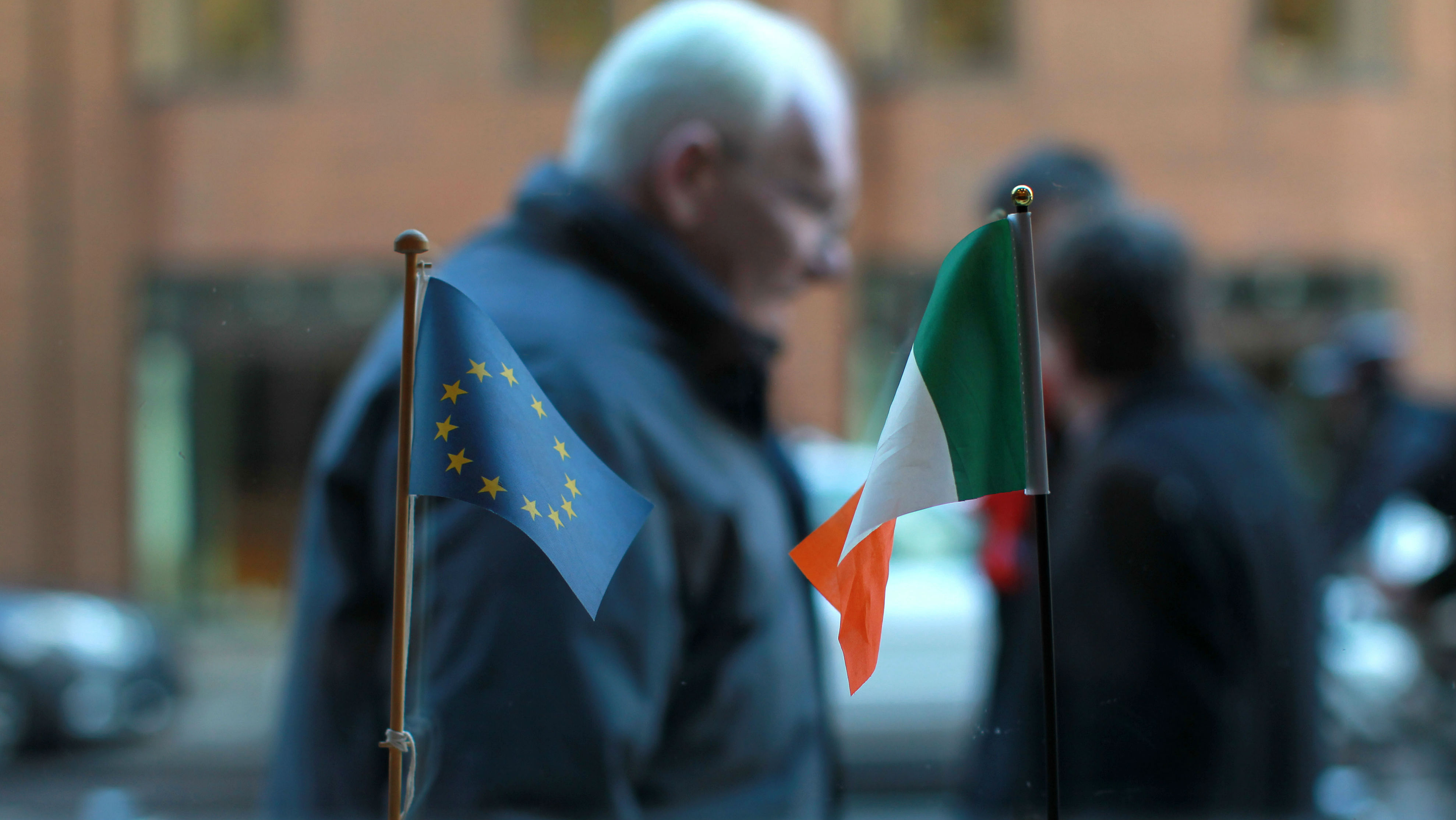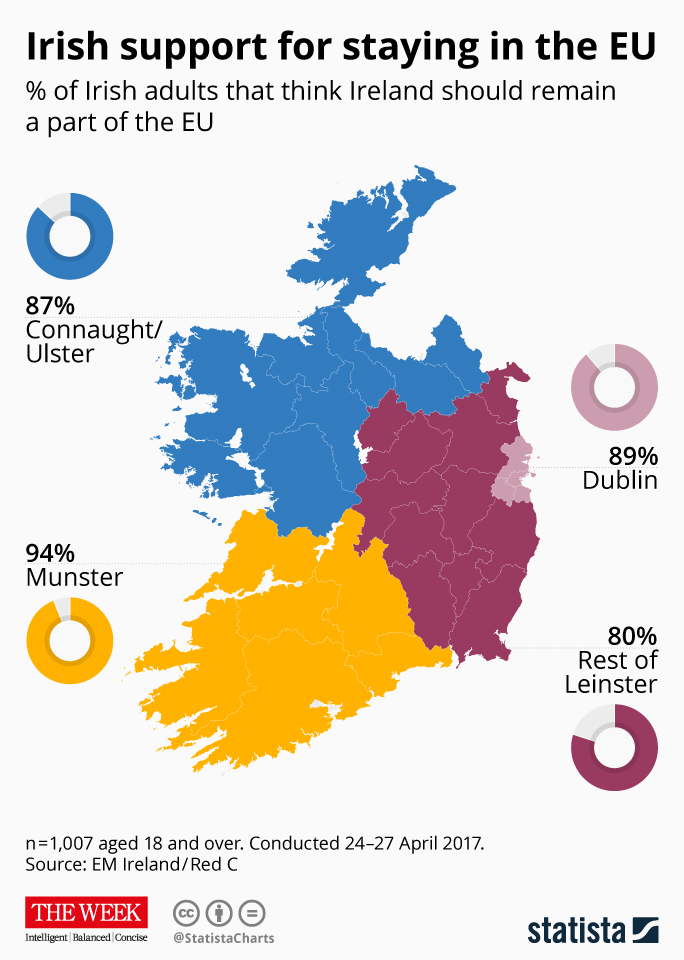Fact Check: Should Ireland be next to leave the EU?
Think tank says Ireland would be better off following the UK out – but does it ignore some important facts?

A free daily email with the biggest news stories of the day – and the best features from TheWeek.com
You are now subscribed
Your newsletter sign-up was successful
Ireland has prospered since it joined the EU in 1973, but with Brexit dominating the headlines some are calling for the country to follow the UK out of the union.
"Until very recently, the very notion of Ireland leaving the EU was so outlandish and marginal that it did not feature in any public discourse in a meaningful way," the Irish Times reported in November.
But a study released in July from an influential right-leaning UK think tank says Ireland should "seriously consider" pulling out of the bloc because it benefits more from closer ties to London than Brussels.
The Week
Escape your echo chamber. Get the facts behind the news, plus analysis from multiple perspectives.

Sign up for The Week's Free Newsletters
From our morning news briefing to a weekly Good News Newsletter, get the best of The Week delivered directly to your inbox.
From our morning news briefing to a weekly Good News Newsletter, get the best of The Week delivered directly to your inbox.
Analysts have taken issue with some of the arguments made in the report, however. What are the facts?
What did the report find?
The Policy Exchange report says there is "really no upside to Brexit" for Ireland: "Whatever the outcome of the Brexit negotiations, there will be a price to pay.”
The report was written by Ray Bassett, a former Irish ambassador involved in Northern Ireland peace talks who served as joint secretary of the British-Irish secretariat in Belfast.
A free daily email with the biggest news stories of the day – and the best features from TheWeek.com
He argues that in the event of a hard Brexit, Ireland's interests would be "better served" by opting out of formal membership of the EU, remaining in a customs union with the UK and negotiating free trade arrangements - like Norway has - with the remaining members.
Maintaining close ties with the UK is crucial as Britain is still "by far" Ireland's main trading partner, accounting for nearly 30 per cent of the country's merchandised imports, he says.
Bassett says Ireland has greatly benefitted from EU membership but questions the direction the bloc is taking and whether the Irish population wants to be a part of it.
"The organisation that Ireland joined, and where it once thrived, is disappearing," he argues.
The majority of Irish people think the nation's relationship with the UK is more important than its ties with the EU, Bassett claims, and Euroscepticism is on the rise. "There are growing complaints about Brussels interference and a feeling that EU membership is now actually a limiting factor," the report argues.
Any new deal "would not be as advantageous as full membership" of the EU, Bassett admits. "However, the aim would be to get as close as possible to full and free access to the single market."
In addition to the trade implications, Ireland would also likely have to pay the EU an exit fee, which in the case of the UK has been estimated as high as £100bn with the final figure still being negotiated.
While Bassett doesn't make a financial argument for Irexit in his study, he notes that the European Commission has discussed the introduction of a common consolidated corporation tax base (CCCTB), which Ireland would likely resist given its position as a low-tax jurisdiction with a 12.5 per cent rate of corporate tax.
"There are varying estimates of the cost to Ireland of a CCCTB, with the EU claiming that it would only reduce revenue to Ireland by 0.2%, while the Irish Business and Employers Confederation believe, more realistically, that the cost would be around 7.7% of total tax revenue or €3.9bn," says Bassett.
What was the response?
Bassett's arguments are "not just flawed but factually incorrect," tweeted John Walsh, deputy editor and business editor at the Ireland edition of The Times.
"Perfectly fine discussing Irexit if all the facts are on the table, not just selective [and] misleading ones," he added. "That is how Brexit happened."
John O'Brennan, professor of European politics at the National University of Ireland, Maynooth, agrees that the data presented on Ireland-UK trade does not provide the full picture as it fails to recognise that Ireland used EU membership to reduce trade dependency on UK.
Debating whether to leave the EU is healthy and Ireland should carefully weigh up its options, says Dan O'Brien, chief economist at the Institute of International and European Affairs in Dublin.
However, the wider economic case for Irexit is "non-existent," he argues in the Irish Independent.
"Contrary to frequent comment, the UK is not Ireland's biggest trading partner. It is now in third place, accounting for only 15 percent of two-way trade in goods and services," says O'Brien.
"The other 26 members of the EU account for more than twice as much," he says, citing official figures from Ireland's Central Statistics Office.
O'Brien also warns that it would take years for an Ireland-UK trade deal to be negotiated. During that time the country "would languish in a worst-of-both-worlds limbo, out of the EU and with no new Ireland-UK arrangement," he says.
What does the public think?
The vast majority of people in Ireland are opposed to an exit from the union, according to a poll commissioned by the European Movement Ireland, an NGO that works to develop links between Ireland and the EU. Of those questioned, 88 per cent said the country should remain in the bloc.

Infographic by www.statista.com for TheWeek.co.uk
Bassett's suggestion that the public is growing increasingly sceptical about the EU "has been wholly disproved by multiple surveys, year in year out," says Professor O'Brennan.
Support for the EU has always been high in Ireland and has increased steadily since the Brexit vote.
A survey conducted in December 2016 found that 80 per cent of Irish citizens would vote to remain in the EU, a two per cent increase from the previous year.
"It makes Ireland one of the most pro-EU countries on the continent, along with Spain," the Irish Independent reported at the time.
What do Irish politicians think?
The government continues to make it clear that Ireland's membership of the EU is not in doubt, the Financial Times says.
There is no Irish equivalent of Ukip, the driving force behind the UK campaign to leave the EU, it added. "But there are some voices on the libertarian right who advocate such a course."
Who is right?
There currently appears to be little public or political appetite for an Irish exit from the union, despite Bassett's claims. While the UK is clearly an important trading partner for Ireland, the evidence suggests that Dublin has far more to lose from severing ties with Brussels.